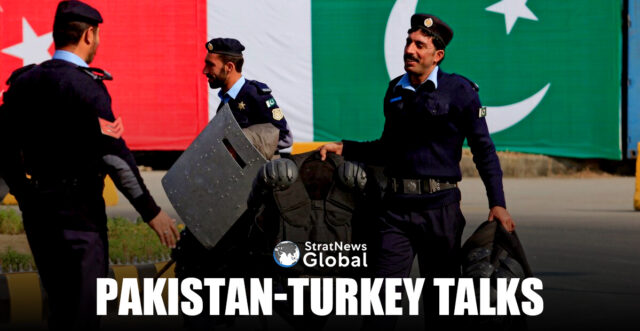Turkey’s President Recep Tayyip Erdogan met with Pakistan’s Prime Minister Shehbaz Sharif in Istanbul on Sunday, affirming their commitment to strengthening bilateral ties, especially in the areas of defence, energy, and transportation, according to a statement from Erdogan’s office.
Turkey has strong ties with Pakistan, both being largely Muslim countries and sharing historical links, and expressed solidarity with it during its recent clashes with India.
Erdogan’s office said he told Sharif it was in the interest of Turkey and Pakistan to increase solidarity in education, intelligence sharing and technological support in the fight against terrorism.
Turkey‘s Foreign Minister Hakan Fidan, Defence Minister Yasar Guler, and intelligence agency chief Ibrahim Kalin also attended the meeting.
Earlier in May, Erdogan expressed solidarity with Pakistan after India conducted military strikes in response to a terrorist attack in Jammu and Kashmir’s Pahalgam. The clashes between the nuclear-armed neighbours were the worst in more than two decades.
Ankara also maintains cordial ties with India, but after Erdogan’s expression of support for Pakistan, small Indian grocery shops and major online fashion retailers boycotted Turkish products.
India Takes Multiple Steps
Following Turkey’s open support for Pakistan during the recent conflict, India has taken significant measures reflecting its growing disapproval.
The Indian government revoked the operating license of Celebi, a ground handling service provider linked to Turkish interests, signalling a clear message of discontent.
This move disrupts Turkish operational capabilities within Indian airports and highlights the increasing diplomatic strain between the two countries.
Additionally, the partnership between IndiGo Airlines, India’s largest carrier, and Turkish Airlines is currently under scrutiny.
Indian authorities are reportedly reviewing the codeshare agreement and other collaborative arrangements, reflecting broader concerns about Turkey’s stance in the regional conflict and its implications for bilateral ties.
These actions indicate a shift in India’s approach toward Turkey, balancing commercial interests with national security and geopolitical considerations.
While the full impact on India-Turkey economic relations remains to be seen, these developments highlight the heightened tensions and the complexities involved in navigating regional alliances amidst ongoing conflicts.
(With inputs from Reuters)





